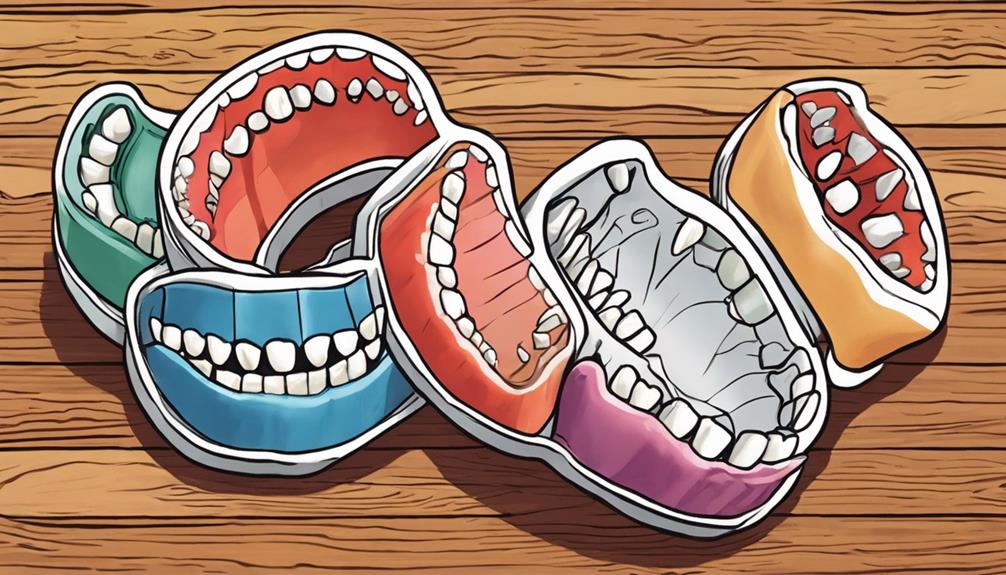Keeping your kids' teeth healthy goes beyond regular brushing. Start with dental sealants to protect molars from cavities. Encourage healthy snacks like crunchy fruits and veggies, which can clean teeth naturally. Don't forget regular dental check-ups—they catch issues early and keep smiles bright. Consider using fluoride treatments for added protection against decay. Get your kids involved by turning brushing into a game or reward system. Also, guarantee they're drinking plenty of water for hydration and mouth cleanliness. By mixing fun with these strategies, you're setting the stage for lifelong dental health. Find out more surprising tips to enhance their smile! The best time for kids to brush is after meals to remove food particles and plaque. Incorporating a fun timer or music can help them brush for the recommended two minutes. Additionally, teaching them proper flossing techniques from a young age will set them up for success in maintaining good oral hygiene habits as they grow older. Remember, a healthy smile starts with good habits and regular dental care. As kids grow, it’s important to educate them on how to maintain their dental health. Teach them the importance of brushing and flossing every day, and show them how to do it properly. Encourage them to limit sugary snacks and drinks, and to choose water instead. By instilling these habits from a young age, you’ll ensure that they have the knowledge and tools to maintain good dental health throughout their lives. Find more tips and resources on how to maintain kids’ dental health by visiting a pediatric dentist or trusted dental health websites.
Key Takeaways
- Establish a consistent oral hygiene routine by brushing with fluoride toothpaste and flossing daily to prevent plaque buildup.
- Limit sugary snacks and promote crunchy fruits and vegetables to naturally clean teeth and reduce cavity risk.
- Ensure regular dental check-ups for professional cleanings and early detection of dental issues.
- Utilize dental sealants to protect molars and significantly reduce the risk of cavities in children.
Benefits of Dental Sealants

Dental sealants provide an effective shield against cavities, making them a smart choice for your child's oral health. These thin plastic coatings are applied to the chewing surfaces of molars, where they can prevent cavities in children aged 6-11 by about 80% for up to two years and 50% for up to four years. When you choose to use dental sealants, you're greatly reducing the risk of decay and promoting better cavity prevention for your child.
The benefits of dental sealants extend beyond just a few years; they can protect teeth for up to nine years, offering valuable defense through adolescence. Regular dental check-ups every six months are essential for evaluating the status of sealants and determining if re-application is necessary. This guarantees that your child maintains ideal oral health and continues to benefit from the protective properties of sealants.
Moreover, the application process is quick and painless, making it a hassle-free option for you and your child. By opting for dental sealants, you're taking a proactive step in preventing cavities and supporting your child's overall dental well-being.
Pregnancy's Impact on Oral Health

During pregnancy, your oral care plays an essential role in your child's future dental health.
You should prioritize regular dental check-ups and establish good gum care practices for your baby right from the start.
Plus, knowing when to schedule that first dental visit for your child can set the stage for a lifetime of healthy smiles.
Oral Care During Pregnancy
Maintaining good oral hygiene is essential for expectant mothers, as it plays a significant role in the overall health of both mother and baby. Poor dental health during pregnancy can lead to complications, so regular dental check-ups are important. Hormonal changes can increase the risk of gum disease, impacting your future child's oral health.
Here's a quick overview of how oral care impacts both you and your baby:
| Aspect | Importance | Action Steps |
|---|---|---|
| Oral Health Starts Early | Healthy teeth for your child | Schedule a pediatric dental visit |
| Gum Care | Reduces risk of gum disease | Brush their teeth twice daily |
| Baby Teeth | Prevents cavities in baby teeth | Wipe gums post-feeding |
| Bottle Feeding | Avoids sugary liquids at bedtime | Don't put baby to bed with a bottle |
| Early Brushing | Establishes lifelong habits | Start brushing when the first tooth appears |
Baby's Gum Care Practices
Good gum care practices start even before your baby's first tooth emerges, laying the foundation for a lifetime of healthy smiles. To guarantee your baby's gums are healthy, develop a dental hygiene routine right from the beginning. After each feeding, make it a habit to wipe the baby's gums with a damp washcloth. This simple step helps prevent bacteria buildup, setting the stage for those precious first teeth.
Once your baby's first tooth appears, it's time to step up your game. Begin brushing their teeth twice daily with fluoride toothpaste to strengthen those tiny teeth and establish good habits early on. Remember, the earlier you start, the better equipped your child will be to maintain healthy teeth as they grow.
Also, avoid putting your baby to bed with a bottle. This can lead to prolonged exposure to sugary liquids, increasing the risk of tooth decay.
First Dental Visit Timing
Scheduling your child's first dental visit by their first birthday is essential for establishing healthy dental habits early on. This visit should occur within six months after the first tooth erupts, allowing your child to adapt to the dental environment and helping detect any potential issues.
You mightn't realize that oral care during pregnancy plays an important role in your child's future dental health. Poor maternal dental hygiene can increase the risk of cavities in children, so maintaining your own oral health is significant.
Remember to wipe your baby's gums after each feeding to prevent bacteria buildup, helping keep their mouth healthy even before teeth emerge.
Nutrition for Strong Teeth

To keep your child's teeth strong, it's important to limit their sugar intake and encourage healthier food choices.
Incorporating calcium-rich foods and staying hydrated with water can make a big difference in their dental health.
Together, these steps can help protect their teeth and promote a bright smile.
Limit Sugar Intake
Limiting sugar intake is essential for protecting your child's teeth and reducing the risk of cavities. Sugary foods and drinks are a major contributor to tooth decay, and the more frequently your child consumes them, the higher their risk of developing cavities. About 28% of children aged 2-5 already face this issue, so it's vital to take action.
Sticky snacks like chewy candies can cling to teeth, prolonging sugar exposure and increasing the likelihood of cavities. Instead, encourage healthy snack alternatives such as fruits and vegetables. These options not only satisfy hunger but also promote oral health by lowering sugar intake.
Additionally, serving fluoridated water at mealtime can greatly aid in your child's dental health. It helps remineralize teeth and washes away food particles, further minimizing the harmful effects of sugar.
Calcium-Rich Foods
Incorporating calcium-rich foods into your child's diet is fundamental for building strong teeth and promoting overall dental health. Foods like low-fat dairy products, including cheese, yogurt, and milk, are fantastic sources of calcium that help strengthen tooth enamel. This is essential for making teeth more resistant to cavities.
Additionally, vegetables like broccoli and leafy greens, as well as nuts like almonds, offer not just calcium but also other important nutrients that support strong teeth and healthy gums. By including these calcium-rich foods in your child's meals, you can greatly reduce the risk of cavities by neutralizing acids produced by plaque bacteria.
Don't forget about vitamin D! This vitamin is critical for calcium absorption, so pair those calcium-rich foods with sources of vitamin D, such as fortified foods or fatty fish. A balanced diet that includes these elements will guarantee your child's teeth grow strong and healthy.
Hydration With Water
Hydration with water is essential for your child's dental health, as it strengthens tooth enamel and helps prevent cavities. Drinking fluoridated water promotes the remineralization of teeth, making them more resistant to decay. Water also plays a significant role in washing away food particles and bacteria after meals, which keeps your child's mouth clean and reduces plaque buildup.
To improve oral health, it's important to limit sugary drinks. These beverages contribute to cavity-causing acid production, increasing the risk of tooth decay. By encouraging your child to drink water instead of sugary drinks, you can greatly decrease their chances of developing cavities. Serving water at mealtimes helps establish healthier habits and lowers their overall sugar intake, which is beneficial for their dental health.
Moreover, proper hydration helps maintain healthy saliva levels. Saliva is essential in neutralizing acids and protecting against tooth decay. By ensuring your child drinks enough water throughout the day, you're not only quenching their thirst but also safeguarding their smile.
Caring for Braces
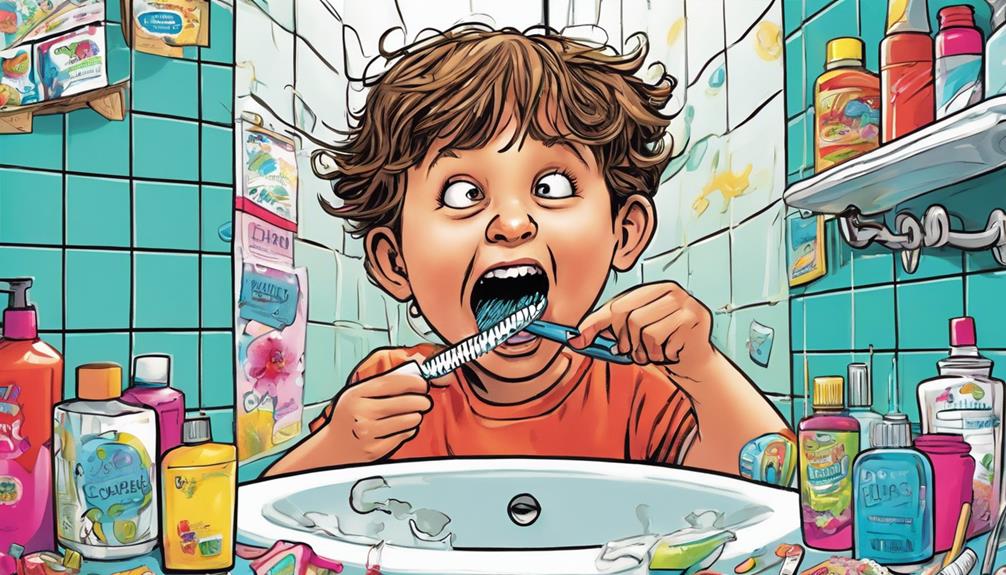
Caring for braces requires diligent attention to oral hygiene to prevent cavities and guarantee effective treatment. When your child has braces, food and plaque can easily get trapped around the brackets and wires. This makes proper cleaning techniques essential. Make certain they brush thoroughly around their braces at least twice a day to keep their oral health in check.
Flossing is equally important. Teach your child to floss daily, using floss threaders or orthodontic flossers, to effectively clean between their teeth and around the brackets. This practice helps to minimize the risk of cavities, which can increase during orthodontic treatment if hygiene practices aren't followed closely.
Regular dental check-ups are significant for kids with braces. These visits help monitor oral health, check for any signs of decay, and determine if dental sealants need re-application. Sealants can protect unbraced biting surfaces, reducing cavity risks.
Importance of Regular Check-ups

Regular dental check-ups play an essential role in catching dental issues early, ensuring your child's smile stays healthy and bright. These visits allow you and your pediatric dentist to monitor your child's dental health and identify potential problems like cavities before they escalate.
Regular check-ups are also vital for professional cleanings, which remove plaque and tartar that regular brushing can't tackle. During these appointments, your dentist can offer personalized advice tailored to your child's unique needs, helping you establish effective oral hygiene routines at home.
They can also track the growth and development of your child's teeth, spotting any alignment issues early on, especially before those permanent teeth come in.
Effective Brushing Techniques
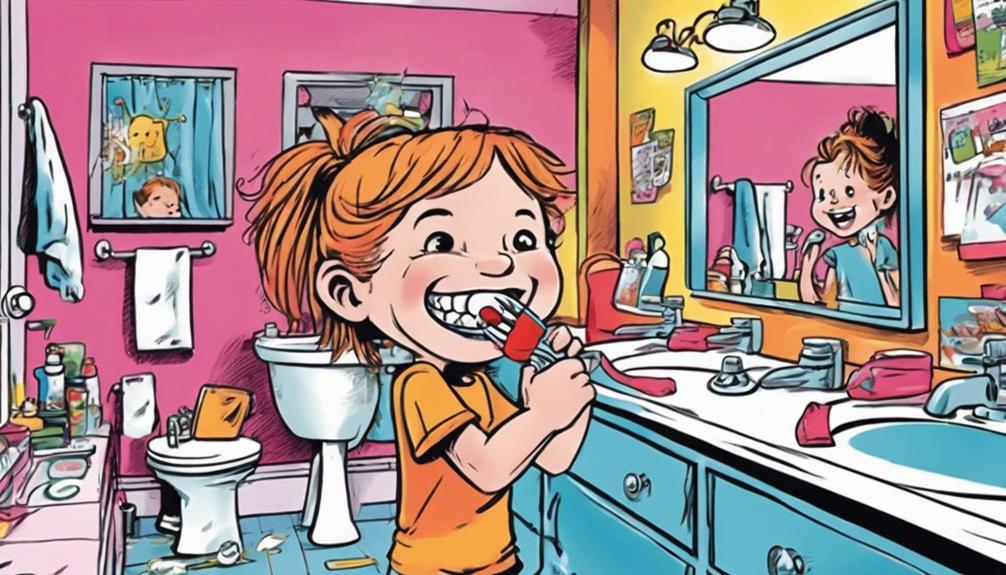
Establishing effective brushing techniques is key to maintaining your child's dental health and guaranteeing their teeth stay strong and cavity-free.
Start brushing your child's teeth twice daily with a smear of fluoride toothpaste as soon as the first tooth appears. By age 3, you can shift to a pea-sized amount. Use a soft-bristled toothbrush to protect their gums while effectively removing plaque buildup. Make brushing fun—play a song or use a timer to encourage them to brush for a full two minutes.
Remember, it's important to teach your child to spit out the toothpaste rather than swallow it, promoting proper fluoride use without overexposure. Additionally, floss your child's teeth as soon as two teeth touch, usually around age 3, to clean between teeth where brushing can't reach. This step is vital for preventing cavities in those tight spaces.
Lastly, regularly check their toothbrush, replacing it every 3-4 months or sooner if the bristles are frayed. This guarantees effective cleaning and prevents bacterial buildup.
Fluoride Use and Safety

Fluoride plays an essential role in strengthening your child's tooth enamel, making it more resistant to cavities caused by plaque bacteria and sugars. This mineral aids in the process of remineralization, helping to repair early signs of tooth decay.
However, while fluoride is vital for dental health, it's important to monitor its use to prevent overexposure, which can lead to dental fluorosis.
Here are some key points to reflect on regarding fluoride use:
- Check water sources: Verify the fluoride content in your drinking water. Ideal levels can greatly enhance your child's dental health.
- Professional treatments: Think about fluoride varnishes applied by dentists, especially for children at higher risk of cavities.
Healthy Snacking Tips
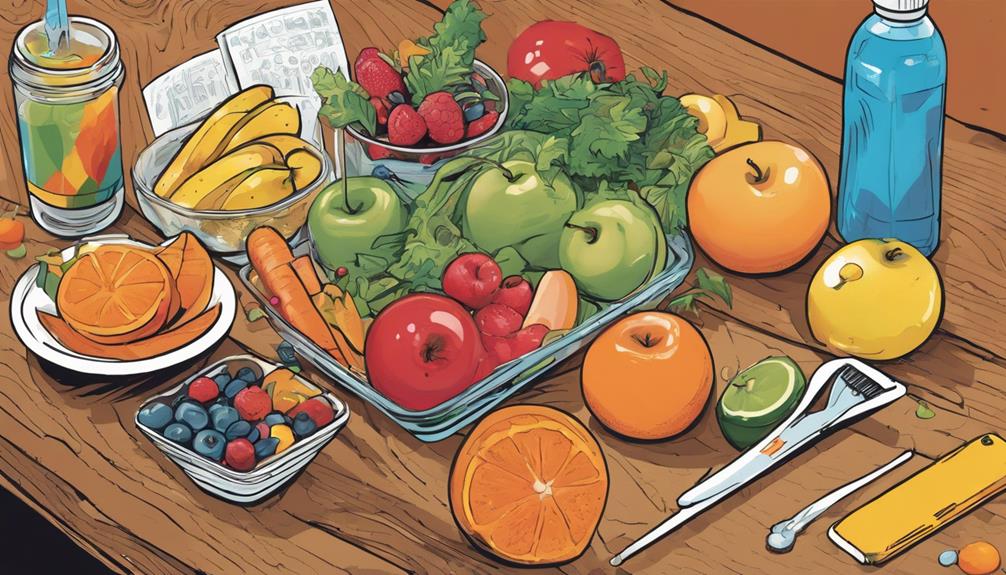
When it comes to healthy snacking, you want to focus on crunchy fruits and veggies that not only taste great but also help clean teeth.
It's important to limit sugary snacks and drinks, as they can lead to cavities.
Don't forget to keep everyone hydrated with water to wash away those snack remnants!
Choose Crunchy Fruits
Choosing crunchy fruits like apples and pears can boost your child's oral hygiene while providing a delicious and healthy snack option. These fruits aren't only tasty but also work wonders for dental health.
When your child bites into these crunchy treats, they help scrub away plaque, promoting better oral health naturally. Plus, the chewing action stimulates saliva production, which neutralizes acids that contribute to tooth decay.
Here are three reasons to incorporate crunchy fruits into your child's diet:
- Natural Plaque Scrub: The texture of these fruits helps remove plaque as your child chews, keeping their teeth cleaner.
- Reduced Cavity Risk: Swapping sugary snacks for crunchy fruits can greatly lower the risk of cavities.
Limit Sugary Snacks
Limiting sugary snacks is essential for protecting your child's teeth from cavities and promoting better oral health. Sugary foods and drinks feed plaque bacteria, which produce acids that erode tooth enamel, increasing cavity risk. Chewy candies and sticky snacks can cling to teeth, prolonging sugar exposure and heightening the chances of developing cavities.
To combat this, encourage healthier snack alternatives. Fresh fruits and vegetables not only provide essential nutrients but also help scrub plaque from teeth. When you're planning snacks, consider incorporating calcium-rich options like cheese or yogurt without added sugars. These snacks can strengthen enamel and support overall dental health.
Additionally, implement smart snacking practices. Serving water with meals instead of sugary drinks can help wash away food particles and reduce acid exposure to teeth. By making these simple changes, you'll be taking significant steps to limit sugary snacks in your child's diet.
This proactive approach can greatly reduce the likelihood of cavities and promote a brighter, healthier smile for your little one. Remember, every small change counts in the battle against plaque bacteria and cavity risk!
Hydrate With Water
Encouraging your child to hydrate with water not only complements efforts to limit sugary snacks but also plays an essential role in keeping their teeth healthy. Water helps wash away food particles and bacteria, greatly reducing the risk of cavities. By promoting regular water intake, you strengthen your child's oral health and support their dental development.
Here are some effective tips to make hydration a fun habit:
- Choose fluoridated water: This can strengthen tooth enamel and aid in remineralization, lowering the likelihood of decay.
- Serve water during meals: This limits sugar exposure and prevents acid attacks that can erode enamel.
Establishing a routine of drinking water throughout the day not only supports hydration but also promotes better overall health for your child.
Protective Dental Measures

Protective dental measures, like sealants and mouth guards, play an essential role in keeping your child's teeth healthy and cavity-free.
Dental sealants provide a thin plastic coating on molars, reducing the risk of cavities by about 80% for two years and continuing to protect teeth for up to nine years. Incorporating fluoride treatments strengthens tooth enamel and enhances the effectiveness of these preventative measures.
If your child participates in contact sports, mouth guards are important. They cushion impacts and prevent over 200,000 dental injuries annually, safeguarding your child's smile from trauma.
Regular dental check-ups are crucial for monitoring the effectiveness of sealants and ensuring overall dental health. During these visits, professional cleanings greatly reduce the risk of infections and decay.
You can also consider using antibacterial mouthwash to help lower cavity-causing bacteria levels. This extra layer of defense complements other protective measures, ensuring your child maintains ideal dental health.
Engaging Kids in Oral Care
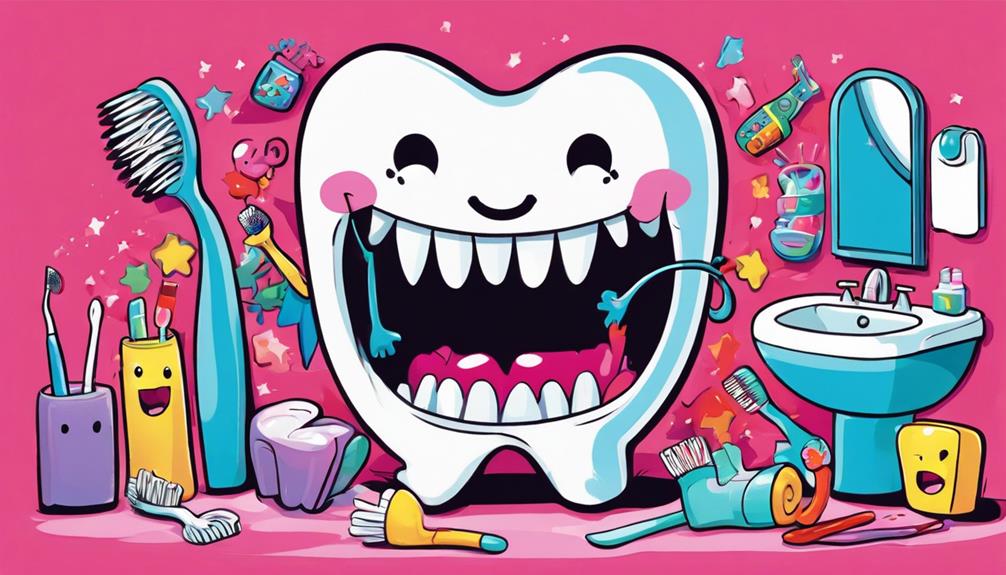
Making oral care enjoyable can transform your child's brushing routine into a fun and engaging part of their day. When kids see brushing their teeth as a game, they're more likely to embrace it. Here are some strategies to help your child learn the importance of oral hygiene:
- Sing or use timers: Play a favorite song or set a timer for two minutes to encourage them to brush longer.
- Choose colorful tools: Let them pick out a fun toothbrush and flavored toothpaste to make brushing exciting.
Involving your child in selecting healthy snacks also plays a significant role. Explain how choices like fruits and veggies can benefit their teeth.
Additionally, regular dental visits can help your child feel comfortable and engaged in their oral care.
Frequently Asked Questions
How Can I Make My Kids Teeth Healthy?
To make your kids' teeth healthy, encourage regular brushing and flossing, limit sugary snacks, schedule their first dental visit by age one, and guarantee they get enough fluoride through water and treatments.
How Do I Stop My Child's Teeth From Rotting?
Did you know kids aged 6-11 without dental sealants have nearly three times more cavities? To stop your child's teeth from rotting, guarantee regular check-ups, twice-daily brushing, and limit sugary foods and drinks.
How Can I Keep My Kids Teeth Safe?
To keep your kids' teeth safe, brush twice daily with fluoride toothpaste, limit sugary snacks, encourage healthy foods, schedule regular dental check-ups, and teach them proper brushing and flossing techniques for lifelong dental health.
How Can I Protect My Child's Teeth From Decay?
To protect your child's teeth from decay, apply dental sealants, limit sugary snacks, encourage regular brushing with fluoride toothpaste, and schedule their first dental visit early. Promote healthy snacks and fluoridated water at mealtime, too.
What Unexpected Ways Can I Keep My Child’s Teeth Healthy to Prevent Bad Breath?
Looking for tips on fixing child bad breath? In addition to regular brushing and flossing, try giving your child crunchy fruits and vegetables like apples and carrots to help clean their teeth. Encourage them to drink plenty of water and limit sugary snacks to maintain good oral health and prevent bad breath.
How Can I Keep My Child’s Teeth Healthy to Prevent Bad Breath?
To prevent fixing bad breath in children, it’s essential to maintain their oral health. Encourage regular brushing and flossing, limit sugary snacks, and schedule dental check-ups. Provide a balanced diet and plenty of water. Teach good oral hygiene habits early to promote long-term dental health and prevent bad breath.
Conclusion
Keeping your kids' teeth healthy doesn't have to be a chore. You might think it's too much work, but with simple changes and fun activities, you can make oral care enjoyable for everyone.
By embracing dental sealants, focusing on nutrition, and involving your kids in their care, you'll not only protect their smiles but also instill lifelong habits.
Remember, a little effort today can lead to healthier teeth tomorrow—so get started on this journey together!

